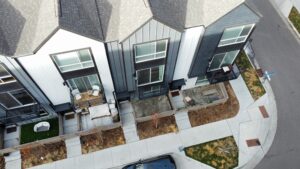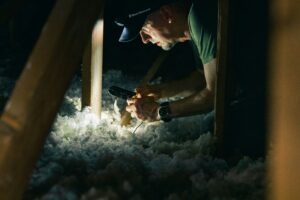Guarding Your Denver Home: Navigating Mold and Moisture Risks

Denver, with its picturesque landscapes and moderate climate, may not be the first place that comes to mind when you think of mold and moisture issues. However, despite the city’s relatively dry climate, homeowners in the Mile-High City are not immune to the potential risks associated with these hidden threats. In this blog, we will delve into the importance of checking for mold and addressing potential moisture issues, highlighting why these concerns should be at the forefront of every homeowner’s mind.
Understanding the Climate
Denver’s climate is characterized by low humidity and a high altitude, creating an environment that may seem inhospitable to mold growth. As a high desert region, the air in Denver is typically dry, but the city’s unique climatic conditions, including temperature variations and occasional rainfall, can still contribute to moisture-related problems within homes. The combination of high altitude and fluctuating weather patterns requires homeowners to be vigilant in addressing and preventing mold and moisture issues. Understanding these intricacies is crucial for effective home maintenance in Denver’s distinctive climate.
Identifying Moisture Intruders
Moisture issues can manifest in various forms, from leaking roofs and plumbing problems to insufficient ventilation. It’s crucial to recognize the signs of these moisture intruders to mitigate potential mold growth and structural damage. Signs may include discolored walls or ceilings, a musty odor, peeling paint, or even visible water stains. Promptly addressing these indicators is essential in preventing the escalation of moisture-related problems, safeguarding the structural integrity of your home and maintaining a healthy living environment.
The Silent Menace: Mold Growth
Mold, a type of fungus, is a silent intruder that can compromise indoor air quality and pose health risks to occupants. Denver homeowners should be aware that mold can grow in hidden areas where moisture accumulates, such as basements, crawl spaces, and behind drywall. Vigilance in addressing these hidden threats is crucial for maintaining not only a comfortable home but also the overall health of its inhabitants.
Health Implications of Mold Exposure
Mold is not only a threat to the structural integrity of a home but also a potential hazard to human health. Exposure to mold spores can lead to respiratory issues, allergic reactions, and other health complications. Given Denver’s reputation for clean air and outdoor activities, it’s especially important for residents to prioritize indoor air quality, ensuring a safe and comfortable environment for themselves and their loved ones.
Common Causes of Mold and Moisture Issues

Roof Leaks and Denver’s Weather Challenges
Denver encounters more frequent snowfall during the winter months, alongside sporadic rainfall, creating challenges such as roof leaks. The city’s diverse weather conditions, including hailstorms and rapid temperature fluctuations, can exacerbate the vulnerability of roofs. Water infiltration through the roof can create an environment conducive to mold growth in attics and ceilings. It is imperative for homeowners to address any potential roof issues promptly, reinforcing the protective barrier against moisture intrusion.
Plumbing Issues and Moisture Intrusion
Leaky pipes and plumbing problems are common culprits for moisture issues. Even minor leaks can lead to significant water damage and mold growth over time. Homeowners should be particularly vigilant in promptly addressing any signs of water leakage, such as discolored spots on walls or ceilings, unusual odors, or unexplained increases in water bills. Timely intervention and repairs can prevent the progression of these issues.
Inadequate Ventilation: A Breeding Ground for Mold
Inadequate ventilation in bathrooms, kitchens, and other confined spaces can result in excessive humidity, creating conditions favorable for mold development. It’s crucial for homeowners to prioritize proper ventilation by using exhaust fans, opening windows when possible, and considering air circulation solutions. Regularly inspecting and maintaining ventilation systems will contribute to a healthier indoor environment, reducing the risk of mold growth and maintaining the integrity of the home.
Basement and Crawl Space Concerns: Moisture’s Playground
Colorado homes with basements or crawl spaces may be susceptible to moisture infiltration. Insufficient waterproofing and ventilation in these areas can lead to dampness and mold growth. It is advisable for homeowners to invest in effective waterproofing measures, such as sealing cracks, installing proper drainage systems, and ensuring adequate ventilation, to create a more resilient defense against potential moisture-related issues in these susceptible spaces.
Our Inspection Approach
Thorough Mold and Moisture Inspections
At 5280 Property Inspections, we prioritize thorough examinations to identify potential mold and moisture issues. Our inspectors utilize comprehensive techniques, including advanced moisture detection tools and infrared imaging, to pinpoint areas of concern. This commitment to detail ensures that no potential threat goes unnoticed, allowing homeowners to address issues promptly and maintain a secure and healthy living environment.
Assessing Ventilation Systems to Combat Mold
Ensuring adequate ventilation throughout the home, especially in areas prone to moisture buildup, is crucial. Our inspectors assess the effectiveness of existing ventilation systems and recommend improvements if necessary.
Swift Repairs to Curb Mold Proliferation
At 5280 Property Inspections, we recognize the urgency of addressing leaks and water damage to prevent mold proliferation. Whether it’s a roof leak, plumbing issue, or faulty appliance, our focus is on swift identification during the inspection, ensuring you have the answers you need to make informed decisions and providing peace of mind. While we don’t administer repairs personally, our comprehensive inspection services will help determine the best course of action.
Proactive Waterproofing Strategies
Investing in proper waterproofing measures, especially in basements and crawl spaces, is a proactive step in preventing moisture infiltration. Our inspectors identify potential vulnerabilities and offer recommendations for effective waterproofing strategies.
In the heart of Denver’s vibrant community, all homeowners bear the responsibility of safeguarding their residences from the concealed threats of mold and moisture. Despite the generally dry climate, occasional weather challenges demand a proactive approach to home maintenance. Understanding the causes, recognizing signs, and taking timely action empower Denver residents to maintain resilient, mold-free homes.
It is crucial to recognize the significance of a comprehensive inspection process, underscoring the importance of prioritizing regular inspections, proper ventilation, and swift repairs. Take control of your home’s safety and comfort! Choose 5280 Property Inspections for an inspection process that guarantees no potential threat goes unnoticed, paving the way for a secure and comfortable living environment.
Published on February 7, 2024 by Justin Killebrew

